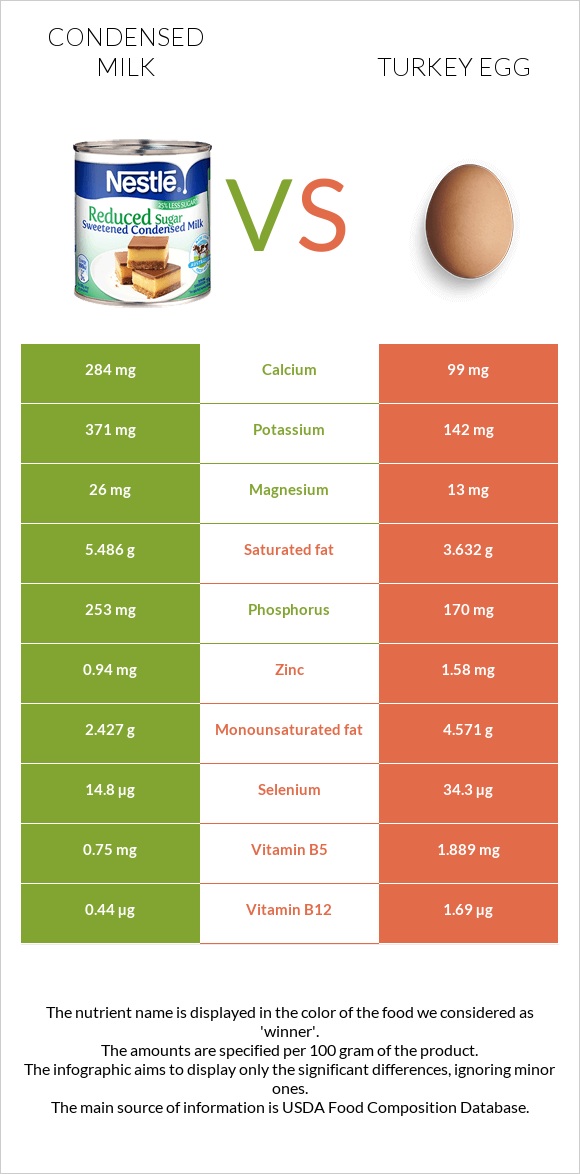Condensed milk vs. Turkey egg — In-Depth Nutrition Comparison
Compare
What are the main differences between condensed milk and turkey eggs?
- Condensed milk is richer in calcium, phosphorus, and potassium, yet turkey eggs are richer in vitamin B12, iron, selenium, vitamin B5, and folate.
- Turkey eggs' daily need coverage for cholesterol is 300% higher.
- Condensed milk has 3 times more calcium than turkey eggs. Condensed milk has 284mg of calcium, while turkey eggs have 99mg.
- Turkey eggs contain less saturated fat.
We used Milk, canned, condensed, sweetened and Egg, turkey, whole, fresh, raw types in this comparison.
Infographic

Infographic link
Mineral Comparison
Mineral comparison score is based on the number of minerals by which one or the other food is richer. The "coverage" charts below show how much of the daily needs can be covered by 300 grams of the food.
| Contains more MagnesiumMagnesium | +100% |
| Contains more CalciumCalcium | +186.9% |
| Contains more PotassiumPotassium | +161.3% |
| Contains more PhosphorusPhosphorus | +48.8% |
| Contains less SodiumSodium | -15.9% |
| Contains more IronIron | +2057.9% |
| Contains more CopperCopper | +313.3% |
| Contains more ZincZinc | +68.1% |
| Contains more ManganeseManganese | +533.3% |
| Contains more SeleniumSelenium | +131.8% |
Vitamin Comparison
Vitamin comparison score is based on the number of vitamins by which one or the other food is richer. The "coverage" charts below show how much of the daily needs can be covered by 300 grams of the food.
| Contains more Vitamin CVitamin C | +∞% |
| Contains more Vitamin EVitamin E | +∞% |
| Contains more Vitamin DVitamin D | +∞% |
| Contains more Vitamin B3Vitamin B3 | +775% |
| Contains more Vitamin KVitamin K | +∞% |
| Contains more Vitamin AVitamin A | +124.3% |
| Contains more Vitamin B1Vitamin B1 | +22.2% |
| Contains more Vitamin B2Vitamin B2 | +13% |
| Contains more Vitamin B5Vitamin B5 | +151.9% |
| Contains more Vitamin B6Vitamin B6 | +156.9% |
| Contains more Vitamin B12Vitamin B12 | +284.1% |
| Contains more FolateFolate | +545.5% |
All nutrients comparison - raw data values
| Nutrient |  |
 |
DV% diff. |
| Cholesterol | 34mg | 933mg | 300% |
| Vitamin B12 | 0.44µg | 1.69µg | 52% |
| Iron | 0.19mg | 4.1mg | 49% |
| Selenium | 14.8µg | 34.3µg | 35% |
| Vitamin B5 | 0.75mg | 1.889mg | 23% |
| Calcium | 284mg | 99mg | 19% |
| Carbs | 54.4g | 1.15g | 18% |
| Choline | 89.1mg | 16% | |
| Folate | 11µg | 71µg | 15% |
| Protein | 7.91g | 13.68g | 12% |
| Phosphorus | 253mg | 170mg | 12% |
| Vitamin A | 74µg | 166µg | 10% |
| Polyunsaturated fat | 0.337g | 1.658g | 9% |
| Calories | 321kcal | 171kcal | 8% |
| Saturated fat | 5.486g | 3.632g | 8% |
| Potassium | 371mg | 142mg | 7% |
| Zinc | 0.94mg | 1.58mg | 6% |
| Vitamin B6 | 0.051mg | 0.131mg | 6% |
| Fats | 8.7g | 11.88g | 5% |
| Copper | 0.015mg | 0.062mg | 5% |
| Monounsaturated fat | 2.427g | 4.571g | 5% |
| Vitamin B2 | 0.416mg | 0.47mg | 4% |
| Vitamin C | 2.6mg | 0mg | 3% |
| Magnesium | 26mg | 13mg | 3% |
| Vitamin B1 | 0.09mg | 0.11mg | 2% |
| Vitamin D | 6 IU | 1% | |
| Sodium | 127mg | 151mg | 1% |
| Vitamin E | 0.16mg | 1% | |
| Vitamin D | 0.2µg | 1% | |
| Manganese | 0.006mg | 0.038mg | 1% |
| Vitamin B3 | 0.21mg | 0.024mg | 1% |
| Vitamin K | 0.6µg | 1% | |
| Net carbs | 54.4g | 1.15g | N/A |
| Sugar | 54.4g | N/A | |
| Tryptophan | 0.112mg | 0.219mg | 0% |
| Threonine | 0.357mg | 0.672mg | 0% |
| Isoleucine | 0.479mg | 0.855mg | 0% |
| Leucine | 0.775mg | 1.201mg | 0% |
| Lysine | 0.627mg | 0.924mg | 0% |
| Methionine | 0.198mg | 0.442mg | 0% |
| Phenylalanine | 0.382mg | 0.773mg | 0% |
| Valine | 0.529mg | 0.985mg | 0% |
| Histidine | 0.214mg | 0.33mg | 0% |
Macronutrient Comparison
Macronutrient breakdown side-by-side comparison
Protein:
7.91 g
Fats:
8.7 g
Carbs:
54.4 g
Water:
27.16 g
Other:
1.83 g
Protein:
13.68 g
Fats:
11.88 g
Carbs:
1.15 g
Water:
72.5 g
Other:
0.79 g
| Contains more CarbsCarbs | +4630.4% |
| Contains more OtherOther | +131.6% |
| Contains more ProteinProtein | +72.9% |
| Contains more FatsFats | +36.6% |
| Contains more WaterWater | +166.9% |
Fat Type Comparison
Fat type breakdown side-by-side comparison
Saturated fat:
Sat. Fat
5.486 g
Monounsaturated fat:
Mono. Fat
2.427 g
Polyunsaturated fat:
Poly. Fat
0.337 g
Saturated fat:
Sat. Fat
3.632 g
Monounsaturated fat:
Mono. Fat
4.571 g
Polyunsaturated fat:
Poly. Fat
1.658 g
| Contains less Sat. FatSaturated fat | -33.8% |
| Contains more Mono. FatMonounsaturated fat | +88.3% |
| Contains more Poly. FatPolyunsaturated fat | +392% |





